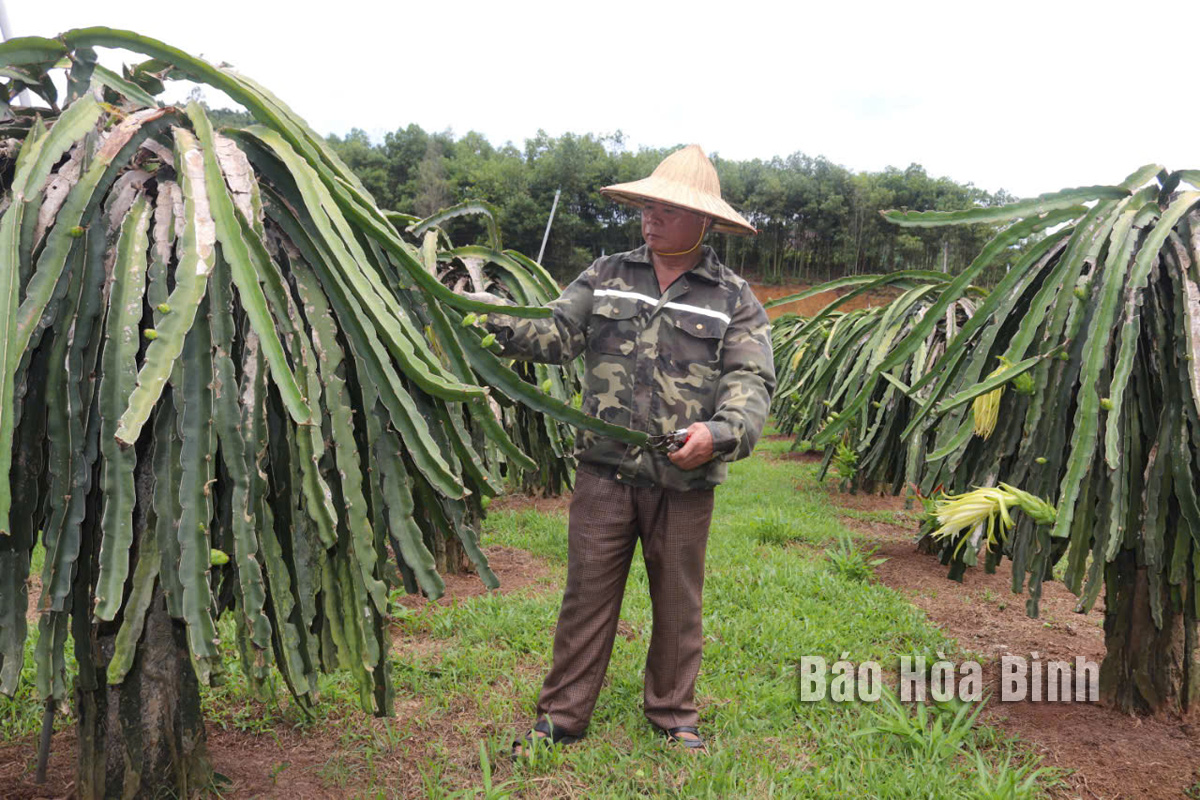
Dong Bac dragon fruit cooperative group in Dong Nang hamlet in Dong Bac commune of Kim Boi district is one of the cooperatives that has demonstrated effectiveness in promoting the linkage of production and consumption of dragon fruit. The entire area of 4.5 ha of dragon fruit is cultivated according to VietGAP standards.
Bui Van Binh in Dong Nang hamlet, Dong Bac commune (Kim Boi district) takes care of a dragon fruit garden.
As a pioneer in growing dragon fruit in the northeastern area of Hoa Binh province, Bui Van Binh in Dong Nang village has accumulated extensive experience and techniques in caring for the plant. Binh said his family has been growing dragon fruit for 10 years.
Previously, his family switched less productive rice growing areas to cultivate corn and sugarcane, but their yield and quality did not meet the required standards.
Binh said that he learned dragon fruit cultivation techniques in Lac Thuy district and then conducted a trial planting.
According to Binh, dragon fruit is planted from November to December. After about 18 months, the plants will bear their first fruits and have fruits steadily from the third year. Dragon fruit is harvested from June to December each year.
Binh said the most important aspect of farming in line with VietGAP standards is that growers must use fertilizers and pesticides in compliance with the stipulated pre-harvest interval, which ranges from 10 to 15 days.
Every year, with 500 dragon fruit trees, Binh's family harvests 10 tonnes of fruits. Thanks to applying safe care procedures, the fruits always ensure sweetness and weight. Each year, the family earns from 120 – 150 million VND (4,880-6,100 USD) after deducting expenses.
As one of the members with a stable income since joining the Dong Bac dragon fruit cooperative group, Bui Van Tinh in Dong Nang village owns a 0.5-ha dragon fruit garden with approximately 700 trees.
Tinh said that to ensure the dragon fruit grows well, his family weeds and fertilises the trees four times a year. Fertilizers used are of organic origin. Compared to other crops, dragon fruit has a long harvesting period, making it easier to sell. High-quality fruits weighing over 400 grammes and with attractive appearance are bought directly by traders from Hai Duong and Hanoi at a price of 20,000 VND per kilogramme. Each year, the family earns about 200 million VND from the crop.
So far, dragon fruit farming has begun to bring economic benefits to 15 member households of the cooperative group. Statistics show that the dragon fruit growing area of Dong Bac commune is about 10 ha, concentrated in Dong Nang, Ve, Dam Dinh, Trang villages.
According to Nguyen Thi Minh Anh, deputy head of the division of agriculture and rural development of Kim Boi district, to develop and expand the area of dragon fruit cultivation, the district's authorities will continue to direct small-scale production households in villages and communes to form cooperatives and produce in line with value chains.
The district will also support local farmers access to loans, grant certifications of good agricultural practices (VietGAP, GlobalGAP), provide training in techniques of dragon fruit cultivation and care, and help households and cooperatives in introducing products and connecting consumption through fairs organised by the district and the province, she said.
Since the beginning of this year, under the direction of the Department of Agriculture and Environment, the Sub-Department of Agricultural, Forestry, and Fishery Product Quality Management has strengthened the integration of the professional activities to promote and guide the organizations and individuals in the production and trading of agricultural, forestry, and fishery products to comply with the legal regulations regarding the use of chemicals, pesticides and veterinary medicines in crop cultivation, livestock farming and aquaculture. They also provide guidance to processing and manufacturing establishments on keeping the records to trace the product origins and using food additives from the approved list according to the regulations.
Hoa Binh province saw a significant rise in state budget revenue in the first two months of 2025, heard a meeting chaired by Vice Chairman of the provincial People’s Committee Quach Tat Liem.
Ha Thi Ha Chi, a 26-year-old graduate in law, has taken an unconventional path by returning to her hometown in Mai Chau district to establish the Tong Dau Cooperative, creating stable jobs for local women and bringing Thai ethnic brocade weaving to the global market.
As the Lunar New Year 2025 approached, pork prices surged, creating a profitable season for farmers in Tan Vinh commune, Luong Son district. Taking advantage of the rising demand, Can Minh Son, a farmer from Coi hamlet, sold over 30 pigs at 69,000 VND/kg, each weighing more than 100 kg. After deducting expenses, his family earned a profit of over 50 million VND.
alternate member of the Central Party Committee, Secretary of the Hoa Binh provincial Party Committee Nguyen Phi Long on March 5 had a working session with Yan Jiehe, Founder and Chairman of the China Pacific Construction Group, one of China's largest private corporations in the field of transport infrastructure. Deputy Secretary of the provincial Party Committee, Chairman of the provincial People's Committee Bui Duc Hinh and leaders of provincial departments and sectors also attended the working session.
The electronic printed circuit board (PCB) manufacturing and processing plant of Japan’s Meiko Group, located at Da River Left Bank Industrial Park in Hoa Binh city with a total investment of over 200 million USD, is expected to create thousands of jobs and make a significant contribution to the local budget.



